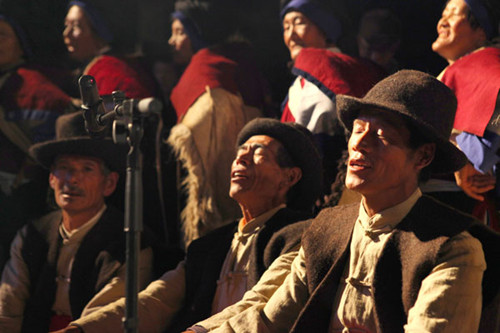
Huayin villagers perform traditional Naxi songs and dances at the Co-Art Festival in Shuhe Old Town in Yunnan province's Lijiang. PHOTO BY HU YUANJUN / FOR CHINA DAILY
Elders in Naxi villages struggle to keep their music and culture alive, but a recent event helped this mission. Chen Nan reports in Lijiang, Yunnan province.
As darkness falls and the temperature drops, He Jixiang sings and dances in a big clearing, with 11 villagers, most of whom are older than 60. In the small village called Huayin in Tai'an township in Yulong Naxi autonomous county, 30 km southwest of Lijiang city in Yunnan province, winter is freezing and electricity is scarce.
He, 82, is from the Naxi ethnic group, and recalls playing as a child in the farmland, where rapeseed flowers bloom during July and August.
His father was a dongba, meaning "wise man" in the Dongba culture and religion created by the Naxi about 1,000 years ago. A dongba is the most respected and sacred leader in the village, who also carries on the traditional language, songs and dances.
Whenever there were big occasions, like weddings, funerals and prayers to the gods, his father led the villagers to practice ceremonies — singing in ancient Naxi dialect and dancing around campfire.
He just went to school for a year and joined his father at ceremonies, where he became fascinated by the long, dramatic and high-pitched melodies.
Since his father passed away, He has become one of the few remaining among the Naxi who can stage those ancient ceremonies and chant the complete songs.
He says women are not allowed to learn the ceremonial songs, so he has been looking for young men in the village to study them. However, he says, the young generation is not so interested, and he worries because those songs and dances are dying.
What made the old man happy recently was the performances he gave during the Co-Art Festival, which brought a variety of events, including dramas, modern dances and art exhibitions from Oct 31-Nov 4 to Shuhe Old Town, only 7 km from Lijiang's old town, another place protected as a UNESCO World Heritage site.
The slow and deep funeral song Meng Da is about the person who has died, describing his life from coming into the world to becoming ashes. The bright and happy wedding song Han Wo O wishes the newlyweds a prosperous life and long-lasting love.
The old people sit around the campfire in their traditional cotton clothes and goatskin capes. The bright red scarves tied around their waists, according to He, symbolize the Jinsha River.
"The river has nourished our Naxi culture," he says. Audiences are amazed by their singing and dancing and spontaneously join in.
He Liyuan, from Huayin village, is the person who helped organize the performance team to display the ancient ceremonial songs and dances. When he came to He Jixiang one day in 2007, the old man nodded yes without hesitation.
He Liyuan, 31, is a Naxi folk dancer in a singing and dancing troupe from Yulong Naxi autonomous county. He recalls hearing the ceremonial songs when he was about 4. The melodies and lyrics, which are in ancient Naxi dialect, sounded mysterious, and he was curious to explore the stories behind them.
An old woman living next to his family, who sang folk songs every day, inspired He Liyuan's determination to revive ancient Naxi songs. He liked sitting next to her and listening to those tunes.
But when the woman passed away at the age of 90, He Liyuan suddenly realized that he couldn't listen to those songs anymore. "The death of the old woman made me sad. The songs died with her," he says.
He started looking for singers who remained in the village in 2006.

Copyright ©1999-2011 Chinanews.com. All rights reserved.
Reproduction in whole or in part without permission is prohibited.